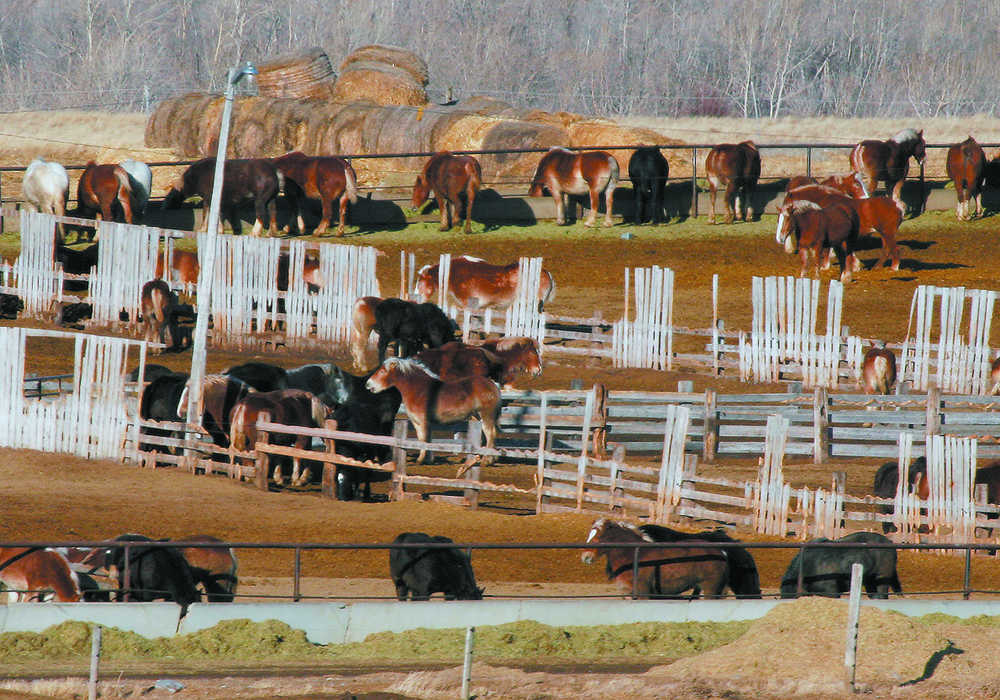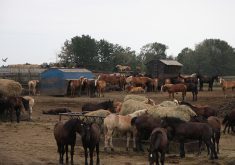Canadian Food Inspection Agency says mortality rate of live horse shipments has been 0.011 percent over the past decade
MEDICINE HAT — A bill that would ban the transport of live horses by air for slaughter will go to the federal agriculture committee after passing second reading in the House of Commons in late January.
Private members Bill C-355 has been working its way through Parliament since introduction in September 2023. It would prohibit export of horses for the purposes of slaughter and carry fines of up to $250,000 or two years in prison for violators.
Kitchener, Ont., Liberal MP Tim Louis introduced the bill to ban live horse export, citing the “special relationship” Canadians have with horses.
Read Also

Canola oil transloading facility opens
DP World just opened its new canola oil transload facility at the Port of Vancouver. It can ship one million tonnes of the commodity per year.
“Throughout Canada’s history, horses have been our steadfast companions, working alongside us in the fields and forests, in communities that make up this great nation. Our history with horses is as rich and diverse as the land we call home,” he said during debate in November.
Alberta is the main exporter of horses, which are mostly shipped to Japan. That country requires the animals to be shipped live because the meat is consumed raw. More than 2,500 live horses are exported annually and transportation regulations are governed by the Canadian Food Inspection Agency.
Under Canadian regulations, full transport time for horses is limited to 28 hours without feed, water and rest. The CFIA says flights from their primary shipping locations in Calgary and Edmonton to Japan take 10 to 12 hours.
Due to Japanese import regulations, horses must be born, raised and reside in Canada for a minimum of six months prior to transport. That makes it impractical to export wild horses or those bought at auction because they lack the needed documentation.
The CFIA notes the mortality rate of live horse shipments has been 0.011 percent for the past decade.
Louis focused on the relationship between humans and horses, pointing to their history in law enforcement and as therapeutic animals, and their role as more than pets.
“In celebrating and appreciating the unique relationship with horses, let us not forget the responsibility that comes with it,” said Louis, as he urged MPs to support the bill.
“We must ensure the welfare of these magnificent creatures, preserving their place in our hearts and in our history.”
Bloc Québécois MP Yves Perron questioned such emotional appeals. He asked whether the bill would open the door for other livestock transport bans.
“If it is cruel to export live animals, why target just one species,” said Perron. “Why introduce a new bill that only concerns horses instead of amending existing legislation and reviewing the transportation conditions?”
Conservative MPs also spoke against the bill, noting the Canadian horse meat market produces more than 1,000 tonnes for domestic consumption and more than 10,000 live horses are exported annually for purposes other than slaughter.
Citing regulations of the bill that would require statutory declarations that horses shipped by air would not be consumed, Red Deer Conservative MP Blaine Calkins said it would become onerous to ship horses by plane.
“The result of this bill would be to essentially restrict the air transportation of all horses in and out of Canada for all purposes. Not only would this bill impose an unfair burden of proof on the pilots and exporters, who cannot always be assured of what the end use is of the horse that is on board, but it would also dissuade them from even taking any live horses as cargo because of the overly punitive fines,” he said.
The Jan. 31 vote on second reading was split along party lines with Liberals and NDP voting 181 in favour of moving the bill to committee, with 137 Conservative and Bloc members voting against.








![Conservative agriculture critic and Alberta Foothills MP John Barlow said some [people who raise horses for the overseas meat market] were harassed and bullied and wanted no part of the study, even though they could lose their livelihood if the bill is passed. | File photo](https://static.producer.com/wp-content/uploads/2024/04/30150023/03-BJM121610horse-feedlot-235x165.jpg)









